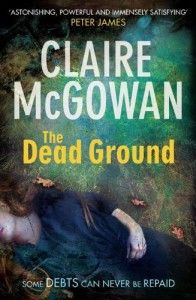 The Dead Ground by Claire McGowan, published by Headline
The Dead Ground by Claire McGowan, published by Headline
The Book of You by Claire Kendal, published by HarperCollins
The Killing Season by Mason Cross, published by Orion UK, Dutton US
Missing You by Harlan Coben, published by Orion
The House of Dolls by David Hewson, published by Macmillan
Sorrow Bound by David Mark, published by Quercus UK, Blue Rider, US
A Colder War by Charles Cumming, published by HarperCollins UK, St Martin’s Press US
Having taken part in many panel discussions about the differences between the way men and women write crime fiction, and the treatment they are given by their publishers, I am particularly interested in this month’s selection.
Claire McGowan’s third title, The Dead Ground, is a quintessentially female novel. Her main character is forensic psychologist Paula Maguire, back in Ireland after some years away and still dealing with the emotional cost of her mother’s disappearance during ‘The Troubles’ and her father’s continuing distress. Paula’s personal difficulties are hugely increased by her unplanned pregnancy, and her doubt about which of two possible candidates is the baby’s 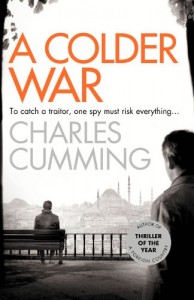 father.
father.
Work itself adds more torture as the police need her help first to find kidnapped babies and then to explain the mind of a killer who could rip a living foetus from the victim’s womb before she died. All this being set on both sides of the border in Ireland, pregnancy, abortion, and women’s right to determine their own lives are matters of urgent debate. There were moments when I wished Paula would brace up a bit, but McGowan’s sad and gripping novel shows how hard it is for women to achieve autonomy in a culture traditionally ruled by superstition and inadequate education, both of which have always bred violent misogyny. As I read, I could not help remembering W. H. Auden’s lines ‘In Memory of W. B. Yeats’: ‘Mad Ireland hurt you into poetry/ Now Ireland has her madness and her weather still,’
Another particularly female novel is Claire Kendal’s first, The Book of You, in which Clarissa is convinced that her ex-husband’s colleague is stalking her. 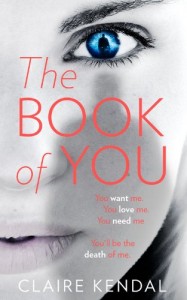 The narrative is split between her first-person diary of their meetings and a third-person account of her days as a juror, trying a rape case. In court, defence counsel take the usual course of suggesting that the sex in question was consensual and that the victim, an admitted drug-taker and -dealer, asked for what happened to her. Both her story and Clarissa’s invite readers to make their own judgements, in a way that underlines all the ambiguity – and the cruelty – the police and lawyers must face as they try to achieve justice in such cases. This is a clever and involving tale.
The narrative is split between her first-person diary of their meetings and a third-person account of her days as a juror, trying a rape case. In court, defence counsel take the usual course of suggesting that the sex in question was consensual and that the victim, an admitted drug-taker and -dealer, asked for what happened to her. Both her story and Clarissa’s invite readers to make their own judgements, in a way that underlines all the ambiguity – and the cruelty – the police and lawyers must face as they try to achieve justice in such cases. This is a clever and involving tale.
At the opposite end of the gender divide is The Killing Season by Mason Cross, who has followed the Lee Child recipe for narrative tension. His saviour-figure is a loner, a freelance finder of people who do not want to be found, now working with law enforcement to track down an escaped serial killer. As I read I could feel myself being manipulated by an efficient player and didn’t mind. For whiling away a sleepless night or an airport delay, this would be ideal.
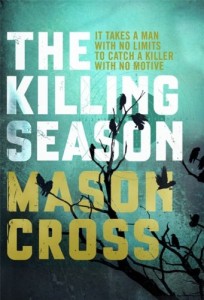 Somewhere between the male and female poles are several satisfying crime novels written by men who are at ease with their female characters. Harlan Coben, an established and bestselling chronicler of suburban America, has written Missing You, a high-tension thriller that is also emotionally astute – and moving. His main character, NYPD Detective Kat Donovan, convinces as a woman in ways some female characters in macho thrillers do not. As in McGowan’s novel, Coben puts what goes on in families at the heart of his narrative so that the revolting activities of the greedy criminals provide no more than the excuse for the action and could be skipped by any squeamish reader.
Somewhere between the male and female poles are several satisfying crime novels written by men who are at ease with their female characters. Harlan Coben, an established and bestselling chronicler of suburban America, has written Missing You, a high-tension thriller that is also emotionally astute – and moving. His main character, NYPD Detective Kat Donovan, convinces as a woman in ways some female characters in macho thrillers do not. As in McGowan’s novel, Coben puts what goes on in families at the heart of his narrative so that the revolting activities of the greedy criminals provide no more than the excuse for the action and could be skipped by any squeamish reader.
David Hewson has emerged from his experience in creating an excellent novelization of the Danish television series The Killing to start a new series of his own set in Amsterdam – an ideal site for a crime novel with its mixture of high liberal civilization and a brutal sex-and-drugs underworld. His sleuth is retired police officer Pieter Vos, who could not bear to stay at work after he and his colleagues failed to find his kidnapped daughter. When another young woman is taken in similar circumstances, his old chief pulls him back into the force, giving him a clumping country bumpkin as his assistant. Aspirant Laura Bekker, dressed by her aunt in risibly ugly home-made clothes, crashed a police car, and has failed at pretty much everything she’s been asked to do, but Vos sees more in her than any of their fellow officers. Their developing professional relationship is one of the charms in a novel that deals with the unpleasant depths to which anyone who wants to succeed in modern politics must sink, the viciousness perpetrated within unhappy families, and the unending wars between established criminals and the newcomers determined to take over their profits. In spite of the underworld sections, it also made me want to go back to Amsterdam.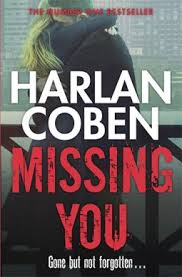
David Mark’s Sorrow Bound provides yet more insight into ordinary families and their exploitation by ruthless organized criminals. Set in Hull during a vividly rendered heatwave, it is the third to feature Detective Sergeant Aector McAvoy, now 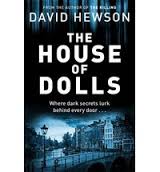 required to see a psychologist to deal with the stress he must have suffered in fighting his last case. Mark writes muscly, colourful prose that works well with his cast of intriguing characters. Few are wholly admirable, which allows him to raise many questions about the precise nature of goodness and the unlikeliness of real justice ever being available to everyone.
required to see a psychologist to deal with the stress he must have suffered in fighting his last case. Mark writes muscly, colourful prose that works well with his cast of intriguing characters. Few are wholly admirable, which allows him to raise many questions about the precise nature of goodness and the unlikeliness of real justice ever being available to everyone.
Spy fiction has been a mainly male preserve, in spite of the many women who have worked in the security service since it was founded. Charles Cumming acknowledges that with his character Amelia Levene’s appointment as chief of the service. In A Foreign Country she behaved in ways I did not believe but now, in A Colder War, she is much more convincing, bringing back disgraced Thomas Kell for one tricky assignment in Turkey. As he unravels the tangles of past and present, he comes into uncomfortably close contact with both professional and personal betrayal. This is 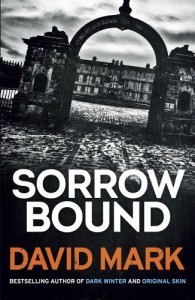 an entertaining novel, which makes me long for the day when women writers do as women spies have done for so long and join the world that is not nearly male as it is so often shown to be.
an entertaining novel, which makes me long for the day when women writers do as women spies have done for so long and join the world that is not nearly male as it is so often shown to be.
